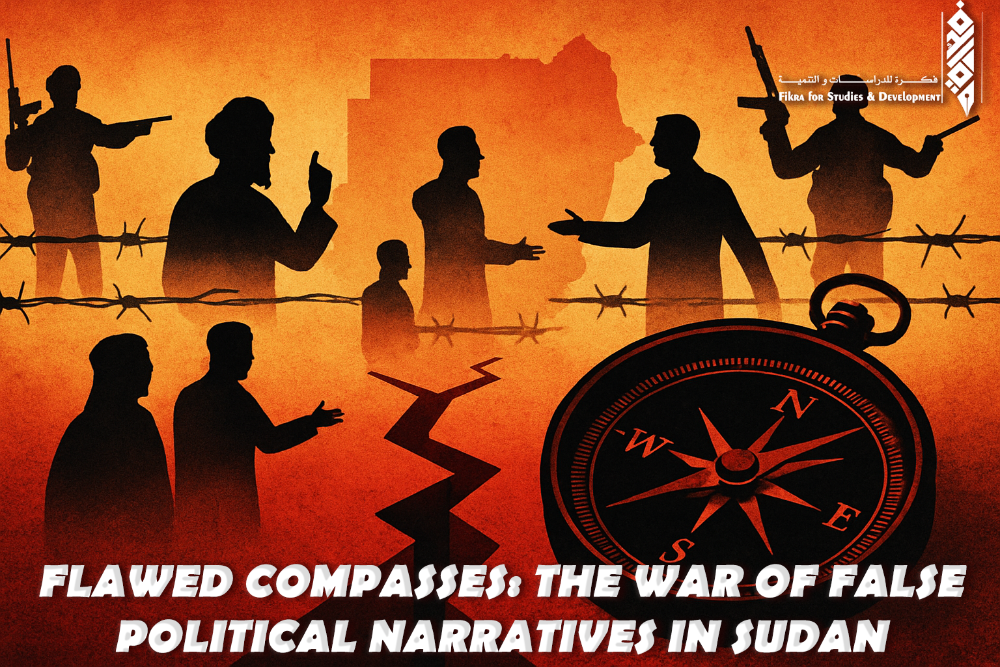Flawed Compasses: The War of False Political Narratives in Sudan
Flawed Compasses: The War of False Political Narratives in Sudan
Amgad Fareid Eltayeb
7 August 2025
“The central political task is not simply to confront visible forms of power, but to critically expose the workings of institutions that present themselves as neutral and independent, to challenge them in a way that unmasks the political violence that has long operated covertly through them—making it visible, intelligible, and thus open to conscious resistance and meaningful struggle against it.”
Michel Foucault | Debate with Noam Chomsky, “Human Nature: Justice versus Power”.
In the maelstrom of Sudan’s tragic war, an insidious truth has emerged, a reality more burdensome than the roar of artillery and more agonizing than the physical devastation. It is the truth of an unprecedented intellectual and moral malaise that has fractured the very foundations of Sudanese political consciousness. The instruments of politics have transcended mere polarization, leading to a total decomposition of “national fundamentals” and “public interest” as meaningful and guiding concepts in political practice. National imperatives have been debased, transforming political debate into crude instruments in a desperate contest for political survival and repositioning.
Since the conflict erupted in April 2023, a broad spectrum of Sudan’s political forces, both left and right, has cynically exploited the tragedy. Their aim is to settle old scores and re-legitimize their exhausted political platforms, converting a national catastrophe into symbolic capital. This is a self-serving pursuit of influence, detached from the war’s grim reality and its immense human suffering, focused solely on the triumph of their own political and organizational selves. What we are witnessing in Sudan is not only a military conflict but a systemic collapse of the very substance of national politics, a radical failure of the ethical compass that ought to guide it. This failure manifests as a feverish opportunism, where the nation’s ravaged remains are treated as political spoils upon which grand, hollow narratives are constructed. In this theater of the absurd, the war itself has been relegated to a mere backdrop for the pathetic drama of restoring decrepit political egos.
This perverse logic—treating the state as plunder—has precipitated a dual collapse at the nadir of our national history: the comprehensive destruction of the country under the weight of cannon fire, and the simultaneous descent of our politics into a void as the pillars of the national project disintegrate.
The Opportunism of the Old Guard
On one side, we find Islamist factions, ejected from power by the popular revolution in April 2019. They are now attempting to whitewash the overwhelming public rejection that fueled the December Revolution and to reposition themselves as guardians of the state and its military against the crimes of the Rapid Support Forces (RSF). In doing so, they seek to erase the legacy of their three-decade reign of corruption and despotism, a reign decisively ended by a popular uprising armed only with its commitment to peacefulness. They conveniently ignore two fundamental truths: that the very RSF militia now terrorizing the Sudanese people is a monstrous product of their own regime, and that their own cadres continue to hold sway over key decision-making levers within it.
These groups frame the war as a vehicle for their insidious return to power, styling themselves as the “national camp” standing against the deluge of RSF destruction. By this logic, they brand any condemnation of the militia’s fascist character and its atrocities as a de facto endorsement of their own political agenda.
The Complicity of the Lost Heirs
On the opposing bank, this Islamist narrative has been abetted by the profound disarray within the camp of the revolutionary forces. Civilian groups within the Forces of Freedom and Change (FFC) coalition—including its subsequent iterations like the Civilian Front, Taqaddum, and Somoud—have echoed the RSF’s own narrative about the war. They portray the conflict as a struggle waged by the RSF militia against remnants of the former regime (feloul) embedded within the army, warning that an RSF defeat would mean the resurrection of the Bashir dictatorship. This discourse aligns with the position of the external enablers of complicity—most notably in the United Arab Emirates—who seek an ideological justification for their continued support of the Rapid Support Forces and their role in fueling the flames of war in Sudan.
This narrative is patently baseless, a fact betrayed by these groups’ own frantic efforts to engage directly with the army’s leadership although that flagrantly contradicts the revolution’s core demand for a civilian-led state. Nevertheless, they persist in framing the war as a simple extension of their old struggle against the Islamists. In doing so, whether through conscious strategy or willful ignorance, they provide ideological cover for a militia whose unprecedented crimes have been documented by the very flight of Sudanese civilians from RSF-controlled territory to the relative safety of army-controlled areas.
The Cognitive Architecture of Complicity
This ideological convergence deepened to the point of equating the entire Sudanese state, including its national army, with the genetically criminal nature of the RSF militia. The situation was further complicated by the continued influence of individuals with organic political and ideological links to the RSF within these alliances. This latent bias was finally exposed in March 2025, when a pro-RSF faction broke away from Taqaddum to form the “Tasis” alliance, openly declaring its support for the militia and revealing the pro-militia sympathies that had existed within these coalitions from the start. Even after this split, elements sympathetic to the RSF’s political allies remained within the “Somoud” coalition, led by former Prime Minister Abdalla Hamdok, prompting him to welcome continued engagement with them even as they openly advocated for the partition of Sudan.
It is a profound epistemological bias—one that renders them willfully blind to truths and empirical realities, compelling them to cling to predetermined ideological frameworks through which they persistently reinterpret the world, not as it is, but as they want it to be.
Instead of occupying a firm moral ground, these forces became entangled in justifying, or silencing, the militia’s heinous crimes. They sought to normalize them under the guise of “political balance” or through the blatant falsification of facts, as exemplified by a May 2023 Civil Front statement that falsely attributed rapes committed by the RSF to the Sudanese army—a fabrication for which they were later forced to apologize. This political mimicry became so pronounced that these alliances effectively became part of the RSF’s propaganda machine, rationalizing its violence as a necessary evil to counter the Islamists.
The Manufactured Dichotomy
In a supreme irony, while these forces, under the chairmanship of the resigned Prime minister Hamdok, attempt to claim the moral mantle of the December Revolution, their alignment with the RSF has provided an invaluable gift to the very Islamists they claim to oppose. Their complicity has allowed the old guard Islamists to conflate the revolution with the militia, rebranding themselves as agents of stability while obscuring their own culpability as the architects of Sudan’s current tragedies.
Conversely, the “Samoud” coalition’s claim to be the sole heir of the revolution’s legacy has dealt a fatal blow to its most resonant slogan: “The military to the barracks, and the Janjaweed must be dissolved“. This clear, potent demand, forged by the masses, articulated the authentic revolutionary stance in confronting the current scene.
Today, these warring political factions apply Noam Chomsky’s model of “manufacturing consent” in a universe entirely detached from reality, where each side preaches to its own choir and ignores the people. They construct a media framework that offers a false binary choice, engineered to constrict the scope of public debate and erase all other alternatives. The discourse is forcibly channeled into two options:
- Accept the absolute dominion of the army, a scenario where Islamists court military leaders’ authoritarian ambitions, thereby negating the revolution’s goals of democratic transition and security sector reform.
- Accept the militia as a fait accompli necessary to confront the old regime, thereby sanitizing its crimes and its existential threat to Sudan’s social fabric.
Both narratives deliberately exclude the authentic third option and the primary demand of the revolution: the establishment of a civil state with a monopoly on legitimate violence, governed by the rule of law. The political question has been perversely shifted from “How do we build a civil state?“to “Whose guns will we borrow to secure our seats in power?“. This is a lazy, yet systematic, process of disinformation by political actors who lack the will to practice politics by genuinely aligning with the people. Concurrently, inconvenient truths that challenge the presumed inevitability of these two scenarios are deliberately obscured within an epistemological labyrinth—one designed to mask the overt authoritarianism embedded in these choices beneath the supposed intricacies of Sudan’s political and social history. Central to this narrative is the attempted reconfiguration of the Rapid Support Forces as a legitimate vehicle for redressing historical grievances of marginalization and peripheral repression—despite the militia’s longstanding role as a principal instrument of that very violence. Indeed, the current war itself was inaugurated by acts of genocidal brutality committed by the RSF against the Masalit in West Darfur, laying bare the grotesque contradiction at the heart of this revisionist framing.
The Politics of Death
Though ostensibly hostile, these two narratives are structurally identical. Both seek to forge a false compass of political righteousness, condemning all who deviate from their path. This is a purely authoritarian project, driven not by patriotism or justice, but by opportunistic political ventures seeking to dominate the landscape, even if it is built upon the nation’s ruins.
The final consequence of this conflict is the mutation of Sudanese politics into Thanatopolitics—a politics of death. Politics is no longer the administration of citizens’ lives, but the cynical exploitation of their death, displacement, and suffering as currency in a power struggle. Even the slogan “No to War” is weaponized to demand the preservation of the militia rather than its dismantlement. The citizens have been stripped of political agency, reduced to a mere body that suffers the violence inflicted by rivals competing over the wreckage of the state.
Both factions, despite their different banners, operate from the same mental framework: a narcissistic political ego, a deliberate confusion of partisan interest with the national interest, and the cynical use of sacred values—the nation, the revolution, democracy—as a veil for their insatiable quest for power. These counterfeit compasses point not toward solutions or truth, but toward whatever path best serves the political actors who wield them. Consequently, any critique that transcends their binary is met with accusations of treason, character assassination, and attempts at political erasure.
Between compasses forged by interest rather than principle, truth has perished. The foundational idea that the nation is greater than any political entity has been lost. The gravest danger today is this collective behavior that eviscerates politics of its noble purpose—the art of responsibly managing public affairs—and transforms it into a grotesque reflection of a selfish war over resources, where truth is profaned and memory is trampled.
This catastrophic war could have been a foundational moment for a new Sudan, had its elites possessed the moral courage to think beyond themselves. Instead, they chose to retreat into the failed politics of the past. The Islamists resurrected their pre-revolutionary playbook, while the other civilian elites reverted to its 2021 pre-coup practices, each gazing into a mirror, cheering their own reflection, and denouncing the others. It is a tragedy that reveals not just political failure, but a profound collapse in the very ethics of national political practice.
To escape this dark tunnel requires more than a political settlement; it demands a profound intellectual mission: the “re-establishment of the political space”. This can only be achieved by building a new discourse founded on principles, not power-sharing, that transcends the false binaries and counterfeit moralities of the current moment. It is the arduous task of rebuilding meaning in parallel with rebuilding institutions. Without it, Sudan will remain trapped in a vicious cycle of self-perpetuating violence, fueled by warring ideologies of ruin, waged one day with weapons and the next with hollow words.


